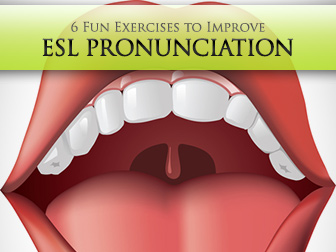Effective communication is a two-way street. ESL students must understand others when they speak English.
But they must also make themselves understood. For ESL students who struggle with pronunciation, this is easier said than done. Which is why it is absolutely essential for you as an ESL teacher to include pronunciation practice in the course syllabus, and not merely correct pronunciation mistakes on the fly.
I know. I know. Pronunciation practice can be tedious. It’s hard! For you and for your students. But there are ways to make pronunciation practice a little more fun. Try any of these exercises!

ESL Pronunciation Practice: 6 Fun Exercises
-
1
Verb Endings
The pronunciation of verb endings is something that is particularly troublesome for some students. The two main problem areas are:
- Present Simple – third person singular. There are three possible sounds for the verb ending – [s] as in talks, [z] as in sees and [iz] as in confuses
- The Past Simple of regular verbs. There are also three possible sounds for the –ed verb ending: [d] as in stayed, [t] as in talked and [id] as in wanted.
After going over the differences, divide the whiteboard into three columns. First practice the verb endings for the third person singular in Present Simple. Place each sound at the top of each column. Say a verb and ask a student to say it in the third person singular. Ask the student which column the verb belongs to.
Finally, walk around the classroom and fire off one verb after another. Students must correctly pronounce the verb ending. If they make a mistake, they must try with a different verb till they get one right.
Do the same with the –ed ending of regular verbs in Past Simple.
-
2
What’s the Word?
Here’s a fun, challenging exercise for students who are familiar with the phonetic spelling of words, or those who are not, but are clever enough to figure it out. Give them a list of words spelled phonetically. Students must write the word each describes:
/ˈmʌð ər/ - mother. To make it more fun, show each student a card with a word and its phonetic spelling and ask them to say the word out loud. The best way to go about this exercise is to practice words with a similar sound so that students start seeing a pattern. -
3
Letters vs. Sounds
One of the things students need to know is that although there are 26 letters in the English alphabet, there are 44 sounds, and that the number of letters in a word is not the same as the number of sounds. For example, the word bat has three sounds and three letters, but batch has five letters and three sounds (the “tch” is one sound).
Divide the whiteboard into six columns and at the top of each write “2 sounds”, “3 sounds”, “4 sounds” and so on till “6 sounds”. Give students a list of words and ask them to place each in the correct column.
-
4
Mimicking Pairs
Mimicking is an essential part of pronunciation practice, that is, you model a word and students repeat by copying the same stress and tone. But you can maximize the opportunities for learning by practicing two sounds at once. Have students repeat sentences like these:
Sit in your seat.
Chips are cheap.
Your niece is nice.
Etc… -
5
Which One Makes Sense?
Present students with two sets of possible answers to a question, for instance:
Hit it. /Heat it.
Ask: The soup is cold. What should I do?He took the bait ./He took the bat.
Ask: What did he take fishing? -
6
Tongue Twisting Fun
Tongue Twisters are fun and excellent for pronunciation practice. This is a great way to help students practice the longer ones. Let’s see one as an example taken from this worksheet, “Betty Botter”.
Write the Tongue Twister on the board:
Betty Botter bought some butter,
"But," she said, "this butter's bitter.
If I bake this bitter butter,
It will make my batter bitter.
But a bit of better butter -
That would make my batter better."
So she bought a bit of butter,
Better than her bitter butter,
And she baked it in her batter,
And the batter was not bitter.
So 'twas better Betty Botter
Bought a bit of better butter.Now, erase some of the words and have students say it again, filling in the blanks.
Betty Botter bought some _____,
"But," she said, "this butter's _____.
If I ____ this bitter butter,
It will make my _____ bitter.
But a bit of ____ butter -
That would make my ____ better."
So she _____ a bit of butter,
Better than her _____ butter,
And she _____ it in her batter,
And the _____ was not bitter.
So 'twas better Betty _____
Bought a bit of better _____.Next, erase a few more words, and then again, till students remember and pronounce the Tongue Twister correctly.
Though pronunciation rules are clear, pronunciation practice is not an exact science.
Simply going over “the rules” is not enough. You have to give students some motivation and the element of fun always does the trick.
What are some of your favorite ways to practice pronunciation? Share them in the comments below!
P.S. If you enjoyed this article, please help spread it by clicking one of those sharing buttons below. And if you are interested in more, you should follow our Facebook page where we share more about creative, non-boring ways to teach English.







